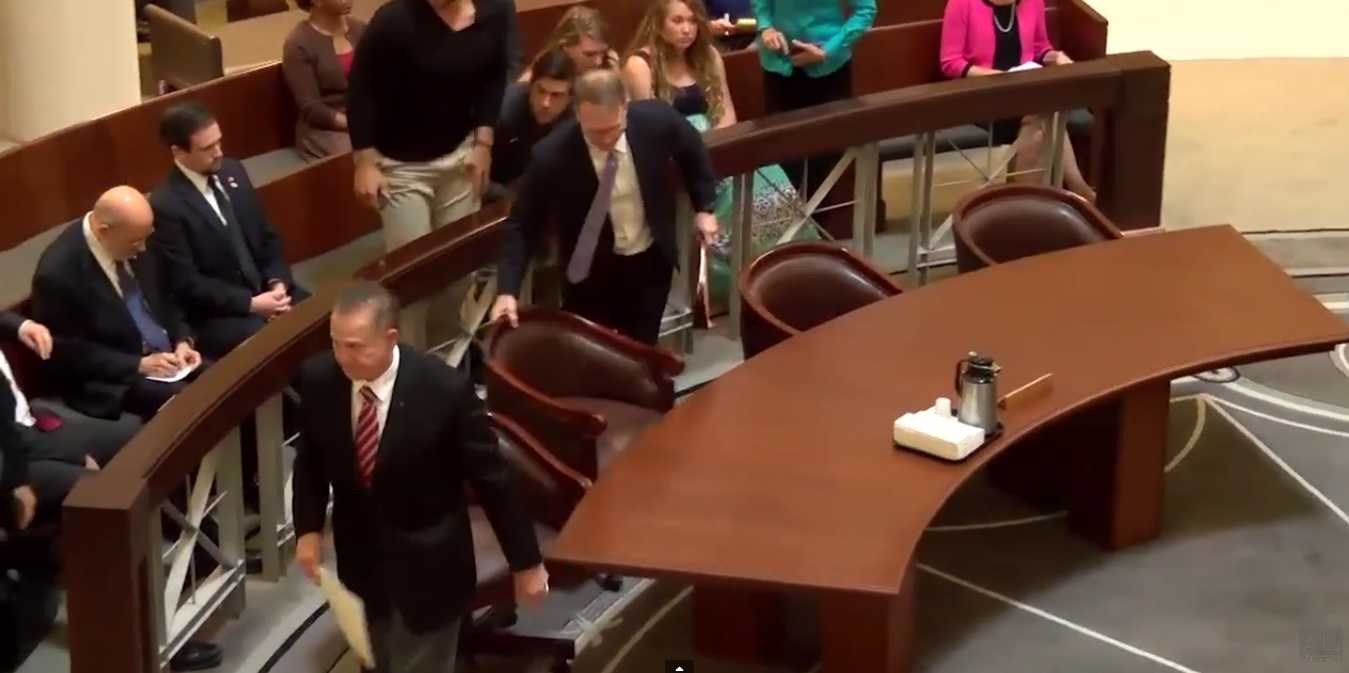 MONTGOMERY, Ala. — Suspended Alabama Chief Justice Roy Moore and his attorney walked out of the state Supreme Court on Thursday in objection to officials ignoring their motion to recuse Acting Chief Justice Lynn Stuart and others from participating in the selection of judges for Moore’s appeal, and that the judges be active and not retired.
MONTGOMERY, Ala. — Suspended Alabama Chief Justice Roy Moore and his attorney walked out of the state Supreme Court on Thursday in objection to officials ignoring their motion to recuse Acting Chief Justice Lynn Stuart and others from participating in the selection of judges for Moore’s appeal, and that the judges be active and not retired.
“We have a motion pending to continue this procedure because of the methodology that was set by justices that should have recused in this sealed case,” attorney Philip Jauregui declared. “This court has refused to address that motion.”
“We can’t address it. You may be seated,” replied Stuart, who took over Moore’s job after his suspension and asked that he remove his belongings from the court.
“Well, I’m leaving, your honor, and Chief Justice Moore will address the media outside,” Jaurequi announced as the two, as well as Moore’s family, stood and walked out of the courtroom.
Moore told reporters outside the courthouse that the Court of the Judiciary (COJ) acted wrongfully in craftily suspending him for the remainder of his term since there was not a unanimous vote to remove him from office. Under Alabama law, removal must be by a unanimous decision. There was only a unanimous vote to suspend Moore but not to remove him.
“It’s a de facto removal,” Moore said. “To have the Court of the Judiciary say that we can’t remove you because we didn’t have the votes, but we can suspend you for two-and-a-half years nearly (the rest of Moore’s term), that’s completely improper.”
“It has to be reversed for the sake of the judges and justices in our state or we’re going to warp the law and just let them skip over a unanimous vote for removal and say they they can remove you for the rest of your term,” he opined.
The COJ advised in its order last month that since it did not have the unanimous votes needed to remove Moore from office, it therefore voted unanimously to suspend him—for the remainder of his term. Moore believes the move was an underhanded means to still remove him by making the suspension term-long instead of temporary.
“A majority of this court also agrees with the JIC that the only appropriate sanction for Chief Justice Moore is removal from office. Removal of a judge from office, however, requires ‘the concurrence of all members sitting,” the COJ had written in its decision. “It is clear there was not a unanimous concurrence to remove the Chief from office, so the COJ suspends him for the remainder of his term.”
As previously reported, the controversy surrounding Moore began in 2013 when two lesbians in the state sued Gov. Robert Bentley, Attorney General Luther Strange and Mobile County Probate Judge Don Davis—among others—in an attempt to overturn Alabama’s marriage amendment after one of the women was denied from adopting the other woman’s child.
In January 2015, U.S. District Judge Ginny Granade ruled in favor of the women, prompting Moore to send a memo to probate judges throughout the state, advising that they are not required to issue “marriage” licenses to same-sex couples as he believed that Grenade’s ruling only applied to the two women.
Moore also wrote a letter to Gov. Robert Bentley, urging him to “uphold and support the Alabama Constitution with respect to marriage, both for the welfare of this state and for our posterity.”
“Be advised that I will stand with you to stop judicial tyranny and any unlawful opinions issued without constitutional authority,” he stated.
The Southern Poverty Law Center (SPLC) then filed a judicial ethics complaint against Moore over his letter to Gov. Bentley, and the homosexual activist group Human Rights Campaign (HRC) submitted 28,000 petition signatures to the JIC calling for Moore’s removal.
As confusion ensued over Moore’s letter to probate judges, one judge, John Enslen of Elmore County, asked the full Alabama Supreme Court for further guidance. In March 2015, six of the nine judges of the Alabama Supreme Court released a historic order halting the issuance of same-sex “marriage” licenses in the state. Moore recused himself from the matter and was not included in the order.
“As it has done for approximately two centuries, Alabama law allows for ‘marriage’ between only one man and one woman,” the 148-page order read. “Alabama probate judges have a ministerial duty not to issue any marriage license contrary to this law. Nothing in the United States Constitution alters or overrides this duty.”
Three months after the Alabama Supreme Court issued its order, the U.S. Supreme Court ruled in Obergefell v. Hodges. The Alabama court did not immediately lift its order following the ruling as it took time sorting through the matter.
Therefore, in January, Moore sent another letter advising that the full court’s previous instructions remained in effect until it issued directives in light of the U.S. Supreme Court ruling in Obergefell.
“Until further decision by the Alabama Supreme Court, the existing orders of the Alabama Supreme Court that Alabama probate judges have a ministerial duty not to issue any marriage license contrary to the Alabama Sanctity of Marriage Amendment or the Alabama Marriage Protection Act remain in full force and effect,” he wrote on Jan. 6.
But he also noted that his memo did not weigh in on how June’s U.S. Supreme Court ruling has impact on the Alabama Supreme Court’s directive, and said that it was not his place to make that determination.
“I am not at liberty to provide any guidance to Alabama probate judges on the effect of Obergefell on the existing orders of the Alabama Supreme Court. That issue remains before the entire court, which continues to deliberate on the matter,” Moore wrote.
In March, the court finally issued its opinions on the matter, dismissing all outstanding cases before the bench.
In May, the Alabama Judicial Inquiry Commission (JIC) announced that it had filed ethics charges against Moore, and suspended the chief justice while he faced a trial before the COJ.
Moore argued during his trial that he had not issued any orders, but only a status update as the Alabama Supreme Court had not rescinded its previous order following Obergefell. The COJ did not believe Moore and found him guilty of all ethics charges, asserting that he had told judges to act contrary to the U.S. Supreme Court’s ruling.
“I would never tell anybody to disobey and order of a federal court; that’s not my job,” Moore said on Thursday. “What I told [probate judges] was the injunction in effect remained valid until it was reversed by the Alabama Supreme Court, when in fact is has not been reversed to this day and that injunction is still in effect.”
“[The COJ] can argue with me or they can argue with the law …. That’s the law of the United States Supreme Court,” he continued. “An injunction once placed by a court is in effect until reversed by that court, the court of first instance, or a higher court, which would be the United States Supreme Court. It still remains in effect.”
Those randomly selected on Thursday for the appeal were retired Judges Frank McGuire III, Ed McFerrin, Susan Moquin, Charles Price, Daniel Reynolds, Michael Nix and Robert Wilters.
[youtube https://www.youtube.com/watch?v=TZhscA5pUEk]
A special message from the publisher…
 Dear Reader, our hearts are deeply grieved by the ongoing devastation in Iraq, and through this we have been compelled to take a stand at the gates of hell against the enemy who came to kill and destroy. Bibles for Iraq is a project to put Arabic and Kurdish audio Bibles into the hands of Iraqi and Syrian refugees—many of whom are illiterate and who have never heard the gospel.Will you stand with us and make a donation today to this important effort? Please click here to send a Bible to a refugee >>
Dear Reader, our hearts are deeply grieved by the ongoing devastation in Iraq, and through this we have been compelled to take a stand at the gates of hell against the enemy who came to kill and destroy. Bibles for Iraq is a project to put Arabic and Kurdish audio Bibles into the hands of Iraqi and Syrian refugees—many of whom are illiterate and who have never heard the gospel.Will you stand with us and make a donation today to this important effort? Please click here to send a Bible to a refugee >>






